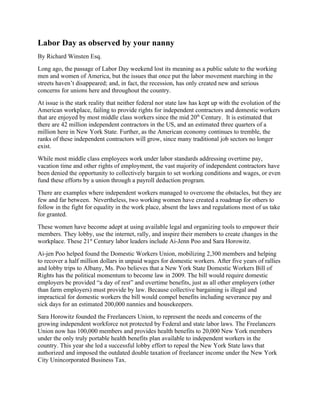Winsten Labor 090309
- 1. Labor Day as observed by your nanny By Richard Winsten Esq. Long ago, the passage of Labor Day weekend lost its meaning as a public salute to the working men and women of America, but the issues that once put the labor movement marching in the streets havenˇŻt disappeared; and, in fact, the recession, has only created new and serious concerns for unions here and throughout the country. At issue is the stark reality that neither federal nor state law has kept up with the evolution of the American workplace, failing to provide rights for independent contractors and domestic workers that are enjoyed by most middle class workers since the mid 20th Century. It is estimated that there are 42 million independent contractors in the US, and an estimated three quarters of a million here in New York State. Further, as the American economy continues to tremble, the ranks of these independent contractors will grow, since many traditional job sectors no longer exist. While most middle class employees work under labor standards addressing overtime pay, vacation time and other rights of employment, the vast majority of independent contractors have been denied the opportunity to collectively bargain to set working conditions and wages, or even fund these efforts by a union through a payroll deduction program. There are examples where independent workers managed to overcome the obstacles, but they are few and far between. Nevertheless, two working women have created a roadmap for others to follow in the fight for equality in the work place, absent the laws and regulations most of us take for granted. These women have become adept at using available legal and organizing tools to empower their members. They lobby, use the internet, rally, and inspire their members to create changes in the workplace. These 21st Century labor leaders include Ai-Jenn Poo and Sara Horowitz. Ai-jen Poo helped found the Domestic Workers Union, mobilizing 2,300 members and helping to recover a half million dollars in unpaid wages for domestic workers. After five years of rallies and lobby trips to Albany, Ms. Poo believes that a New York State Domestic Workers Bill of Rights has the political momentum to become law in 2009. The bill would require domestic employers be provided ˇ°a day of restˇ± and overtime benefits, just as all other employers (other than farm employers) must provide by law. Because collective bargaining is illegal and impractical for domestic workers the bill would compel benefits including severance pay and sick days for an estimated 200,000 nannies and housekeepers. Sara Horowitz founded the Freelancers Union, to represent the needs and concerns of the growing independent workforce not protected by Federal and state labor laws. The Freelancers Union now has 100,000 members and provides health benefits to 20,000 New York members under the only truly portable health benefits plan available to independent workers in the country. This year she led a successful lobby effort to repeal the New York State laws that authorized and imposed the outdated double taxation of freelancer income under the New York City Unincorporated Business Tax.
- 2. These leaders have not been alone in their efforts or accomplishments. Established labor leadership, including national AFL-CIO and New York State AFL-CIO Presidents John Sweeney and Denis Hughes have rallied for domestic workers in Albany, recognizing that in a nation that still embraces the dignity of labor, we can no longer turn a blind eye towards those who work in our homes and care for our children. Labor Day has come and gone but the StateˇŻs labor relations agenda will define what our society looks like for decades to come. Richard Winsten Esq. is a partner in Meyer, Suozzi, English, and Klein P.C., and represents the Freelancers Union and Domestic Workers Union as a consultant and lobbyist.

